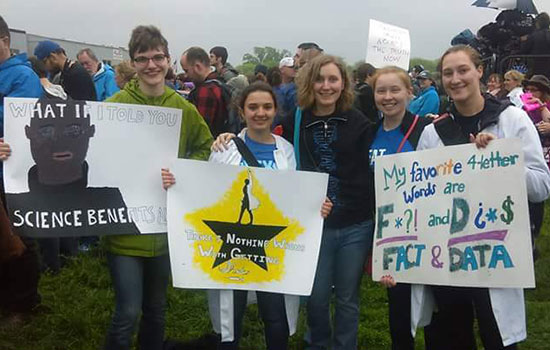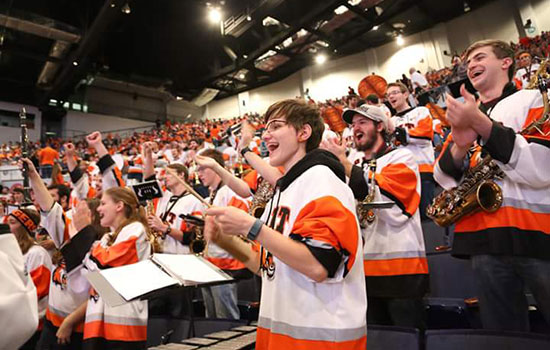Student Spotlight: Secrets to success
Student SpotlightElise Walsh, fourth-year biotechnology and molecular bioscience major
Elise Walsh has been an active member of the RIT Pep Band since 2014.
Elise Walsh is a fourth-year biotechnology and molecular bioscience student from North Tonawanda, N.Y. Walsh is a highly active student who is involved with many activities outside of her classes. She has been an active member of the RIT Pep Band since 2014 as a glockenspiel player. She is also the service chair for the Biotech Club, a member of the Honors Program, an NTID note taker, and a lead peer adviser for the YearOne program. In addition to this work, she is a research assistant for Dr. Feng Cui and has been working with him since 2016.
When she isn’t in classes or working with one of the many groups she is involved in, Walsh is working out at CrossFit Chili or competing in several lifting events in the local area. In December, Walsh placed sixth in CrossFit Boomtown’s ROCStrong event. She looks forward to continuing her competitive CrossFit career as she gets ready to participate in the annual Reebok CrossFit Games Open that begins Feb. 22.
Last year, Walsh’s intelligence, drive and motivation as a student earned her the honor of receiving the David M. Baldwin Memorial Scholarship and the Alfred L. and Ruby C. Davis Scholarship for her impressive academic performance and success. This March, she will be recognized as an Outstanding Undergraduate Scholar. Attaining such honors requires a tremendous amount of work and dedication, but Walsh hasn’t shied away from the work it takes for her to succeed.
Question: Why did you come to RIT?
Answer: During my junior year of high school, I received the RIT Computing Medal Scholarship, so I decided to do some research on the university. When I went on tours, I was very pleased with the campus and academic facilities. I appreciated how many resources there were to help me succeed. I met with current students and admissions counselors, and I was so impressed by how friendly and helpful everyone was. Another major selling point was the science exploration program. I knew that I wanted to major in science, particularly some form of biology, but there are so many options at RIT that it was difficult to determine which was right for me. In this program, a group of 11 of us worked in an interdisciplinary fashion to try to prove that there was life on Mars. It was really exciting to be a part of research as a freshman. Throughout the program, professors from different areas came to talk to us about the various science majors. It was Professor Gary Skuse who really showed me that biotechnology was the major for me. I’m really grateful that I had the opportunity to explore other majors, which I think is a really unique thing about RIT. I definitely couldn’t be happier about my choice to come here!
Q: You’re involved in a lot of different activities in addition to your normal course load. How do you stay organized?
A: I get asked this all the time. Really it boils down to two things: developing good time management skills and allowing yourself time to breathe when you feel stressed. The coursework my freshman year was fairly easy, so even though I took a lot of classes, I still had a lot of time to participate in band and spend time with my friends. During my sophomore year, things got stressful. I started working for YearOne and took some challenging classes, such as Cellular and Molecular Biology and Organic Chemistry. I won’t lie, I really struggled to keep up. I failed my first exams for both of those classes and felt like I wanted to give up everything. I thought back to something my high school English teacher, Mr. Feltges, would say: “You’re allowed to be stressed and depressed for one day, then you need to move on or you won’t make anything of yourself.” I decided to meet with the Academic Support Center and my professors to explain how I was feeling and learn what I could do to succeed that semester. I learned how to better budget my time and started going to office hours. Ultimately, I completed that semester with a 4.0. I’ve had other difficult classes and sometimes take on more work than I can do, but I always think back to my fall semester sophomore year and I tell myself that if I could survive that semester, I can survive this challenge, too.
Q: Last year you received two awards for your academic success and this year you will receive another. How did you feel when you learned you would receive these honors?
A: It’s always nice to be recognized for your hard work. I’m so proud of everything that I’ve accomplished in the past three and a half years I’ve been here, and it makes me feel good to know that other people are proud of me, too. It’s not only a bit of an ego boast, but it also helps push you to see if you can accomplish better and more challenging things.
Q: Do you have any “tips for success” for other students who may want to receive similar honors?
A: The No. 1 thing I can recommend is not to fear failure. In my opinion, failure is the world’s greatest teacher. I’ve failed several assignments, exams and countless experiments, and of course it upsets me, but it also inspires me to do better next time around. If you want to succeed, you can’t view failure as the end of the world. This took me many years to finally accept. Additionally, don’t take the easy way out with classes. You might hear that you shouldn’t take a class with Dr. So-And-So because they’re a really difficult professor. However, in my experience, those professors are the ones that I’ve learned the most from, even if I didn’t get an A in the class. I think that it’s important to push yourself and try to accomplish great things. Finally, make sure you have a good support system. Find people with similar views that can inspire and push you to succeed. I have been fortunate to find people with similar feelings about academia. We push each other, lament each other’s failures, and celebrate each other’s successes. I don’t know where I’d be without my best friends, Erin Neidhart, Renee Meinhold and Jill Lanese.
Q: What motivates you to work hard even when your work piles up, as is inevitable for every semester as it progresses?
A: I think that there’s two major things. First, acknowledging that I’ve gotten through challenging things before helps a lot. If I’ve done it once, odds are I can do it again. Also, I'm OK with whatever the outcome is. If I took a class and worked my butt off, but ended up with a B, I’m totally fine with that. No one’s perfect and you’ll just make yourself miserable if you try to be perfect all the time. Trust me, I know. This took a long time for me to accept too. Second, I tell myself it’s just a few more weeks and then I can relax. It’s difficult, but I can hold out for a few more weeks.
Q: So far, what has been your favorite class?
A: I think that my favorite class was probably Genetics with Associate Professor Dina Newman. I’ve always been fascinated by genetics, so I had really high expectations for this course. Dr. Newman taught the material in a novel way that I thought was really interesting. I enjoyed the group classwork and the case studies we examined. Now that I’m preparing for graduate school, I’m glad to have been exposed to a similar teaching style. Additionally, Dr. Newman is and amazing person to work with. As part of the Honors Program, I need 12 honors points to graduate. Dr. Newman let me contract the course with her and go more in depth about genetics education. Ultimately, I helped her redesign her Human Genetics course and was able to work as her teaching assistant for two semesters.
Q: You self-identify as a “geek;” why are you proud of that traditionally negative title?
A: Who wouldn’t be proud of being a geek! In all seriousness though, I do view it as a compliment when people call me a geek or a nerd. To me, it’s never had a negative connotation. Whenever I’ve been called these things, people have been acknowledging my intelligence and commitment. I’m also really in love with comic books and Star Wars, so I guess I fit the stereotype as well.
Q: What are your plans for after you graduate?
A: After I graduate, I’m going to the Galapagos with Professor Robert Rothman for a week. Then, I’ll be getting my Ph.D. in molecular biology or human genetics. I’ve applied at several schools and have currently participated in three interviews. I’m waiting to hear back from a few more schools before I make any formal decisions.
 Walsh walked with friends for The March for Science in Washington, D.C., last April.
Walsh walked with friends for The March for Science in Washington, D.C., last April.













